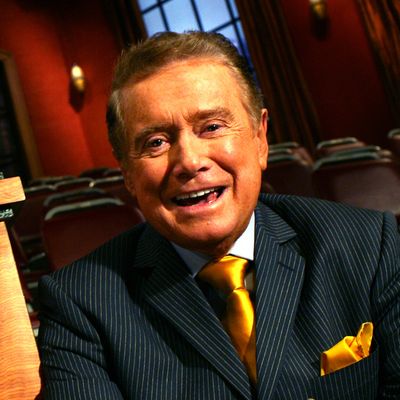
If you turned on a television at any point during the past several decades, chances are good you’d eventually see Regis Philbin’s face on it. The talk-show host, game-show host, author, recording artist, reliably gregarious talk-show guest, and maker of cameo appearances on scripted shows and in movies set the Guinness World Record for most hours spent on U.S. television. The number of hours: 16,746.5 as of September 2011, the year he retired from Live With Regis and Kelly. Given that he continued to show up on TV after that, the final tally is even higher and all but impossible to surpass. If Guinness World Records could measure how much energy a person brought in front of TV cameras during each appearance, it seems likely that Philbin would hold that record, too.
Philbin died of natural causes at age 88 on Friday, his family confirmed today in a statement to People. It’s hard to believe it’s true; he was one of those personalities who was always so around, for so long, that it didn’t seem like he’d ever disappear completely from the pop-cultural landscape or, for that matter, this world. While he retired back in 2011 from his long run on Live!, the chatty morning show he first co-hosted with Kathie Lee Gifford and later with Kelly Ripa, he continued to make TV appearances on various talk shows and sitcoms such as Hot in Cleveland, New Girl, Fresh Off the Boat and, most recently this past April, the ABC comedy Single Parents. That Single Parents performance, in which he played himself and inadvertently distracted Taran Killam’s Will from witnessing the birth of his daughter, was his one of his final times on television; fittingly, it was on a show co-created by one of his daughters, writer and producer J.J. Philbin.
If it felt like Regis — we can call him Regis, because America was on a first-name basis with him — “went away” after leaving Live!, that was only because he was so utterly ubiquitous in the years prior. In the 2000s, it was possible in a single day to see him in the morning trading barbs with Ripa on Live!, on primetime asking Who Wants to Be a Millionaire? contestants if that was their final answer, and on late night, good-naturedly sparring with David Letterman on his Late Show.
Philbin’s Late Night and Late Show appearances were legendary and it was obvious that Letterman and his producers regarded them that way, too, based on the number of times he appeared on the program: 150, more than any other guest. He was there for Letterman’s first show after the 9/11 attacks and he was there on Letterman’s penultimate broadcast in 2015, to bid him farewell.
Philbin, who got his start in show business in the 1950s as a page at NBC and his big break in 1967 as sidekick to Rat Packer Joey Bishop on The Joey Bishop Show, was an old-school type and a consummate New Yorker, in that he was a Bronx native who frequently shouted about minor grievances. One of Philbin’s greatest comedic gifts was his capacity to take his voice up a few notches until it ended on a high at the end of a sentence, whether he was yelling at his producer Gelman or just yukking it up as the guest on a show.
His generosity was similarly elevated: As boisterous and embracing of the limelight as he was, Regis also knew how to sit back, whether in his seat next to Gifford/Ripa or his raised chair on Millionaire, and cede the floor to let someone else do the talking. Nor did he have any qualms about being the butt of the joke, whether it involved being spit on by Kramer in an episode of Seinfeld or having his Christmas album relentlessly mocked by Letterman. Every time he was on a set, he exuded the energy of a man who had just knocked back 18 cups of coffee. There was no half-assing it during those 16,746.5-plus hours of TV, no sleepwalking with him. When Regis Philbin was onscreen, he came to play and he seemed to absolutely relish it.
Because he was a host who liked to improvise, many Americans felt like they knew Regis Philbin. Even if you never watched him play verbal ping-pong with Kathie Lee during their dozen years on the air, or greet Ripa with the nickname “Pippa” during their decade together, you somehow were aware that Regis’s beloved wife’s name was Joy, or that he went to Notre Dame University. This information seeped into the brain unbidden because Regis was everywhere, omnipresent. He was a personality in the truest sense of that word, but he also was authentic. He never seemed like a phony or someone who was trying to be someone other than himself. There aren’t many TV-show hosts about whom that can be said. Now there’s one fewer.


